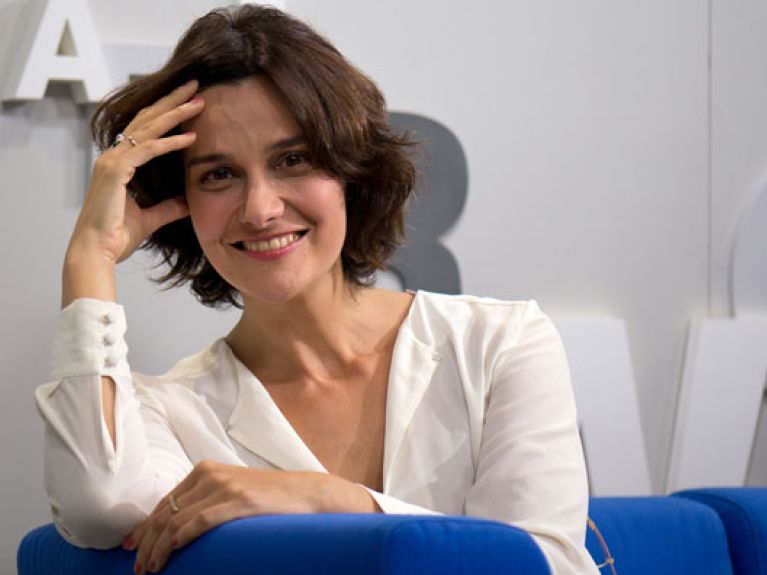One language,countless voices
Germany is an immigration country, Which is also a blessing for German literature.

Falafel, sushi or döner? No one in Germany would have understood this question in 1960. Half a century later these words are familiar to a lot of people. German cities are no longer imaginable without Arab, East-Asian or Turkish restaurants. German cuisine has absorbed international cuisine, mixing plain come cooking with far-eastern spices and experimenting with astonishing cross-over combinations.
Something similar can also be ascertained in contemporary German literature. It is quite obvious that literature in the German-language countries has developed quasi parallel to the new culinary preferences. Above all, more and more people whose mother tongue is not German have opted to write about their own, new view of the world in German.
What is really amazing about this process is that it took so long for the voices of the immigrants to become clearly audible to a really appreciable degree. After all, the first of what were then called “guest workers” came to the Federal Republic from the Mediterranean countries as early as the 1960s; migrants from eastern Europe and the Near and Far East followed later. When the Adelbert von Chamisso Prize for “outstanding authors writing in German whose work is characterised by a change of culture” was first presented in 1985, people still spoke of “literature by foreigners”, and a short time later of “literature of migration”. Most of the prize-winners since the turn of the millennium have shaken off that label. Their works have long since ceased to focus on the periphery of society, although many of their stories still have their roots there. Instead they have arrived in the middle. This is evident in the countless prizes – Navid Kermani, son of Iranian parents and the first German with a so-called migration background to receive the prestigious Peace Prize of the German Book Trade in 2015 – and above all in the many bestseller rankings.
The list of names of the recent Chamisso Prize Winners reads like a Who’s Who in contemporary German literature: Zsuzsa Bánk, Sherko Fatah, Catalin Dorian Florescu, Asfa-Wossen Asserate, Olga Grjasnowa, Nino Haratischwili, Terézia Mora, Saša Stanišić, Feridun Zaimoglu, etc., etc. Be they narrative prose, non-fiction or poetry, their altogether different books can in no way be assigned the label “migration literature”. Yet although they use the German language totally naturally for their own particular literary subjects, their view of the world cannot be totally detached from their roots. In the introduction to the anthology Döner in Walhalla oder Welche Spuren hinterlässt der Gast, der keiner mehr ist? (Döner in Walhalle or What traces are left behind by the guest who no longer is a guest?) Ilija Trojanow, Chamisso Prize winner in 2000, points to the “boundless diversity of exciting biographies“ that are the precondition for exciting texts. And with a dig at the dearth of experience in the literature of the “domestic have nots” he adds that this refutes the platitude that “literature has little or nothing to do with the biography of the writer”.
A novel like Saša Stanišić’s How the soldier repairs the gramophone, 2006, is actually inconceivable without the author’s experiences in what used to be Yugoslavia. Stanišić’s wonderful debut novel about love and death in Bosnia in the 1990s has been translated into almost 30 languages. His most recent novel, by contrast, is set in the Uckermark, a clear indicator that a writer of standing does not let himself be restricted by his origins. After her first novel, The Swimmer, 2002, which is set in Hungary, Zsuzsa Bánk chose a southern German village as the scene of her book Die hellen Tage (The bright days) published in 2011. Yet here too the Hungarian origins of the main protagonists play an important role. The young Berlin writer Olga Grjasnowa, who was born in Azerbaijan, engages ironically with cultural prejudices her 2012 novel All Russians love Birch Trees, in which her protagonist Mascha makes fun of the word “migration background”. Nino Haratischwili, whose debut novel Juja, 2010, made it onto the long-list for the German Book Prize and the short-list for the aspekte literature prize presented by the German TV channel ZDF, tells the story of a family from the Soviet period in Georgia in her 1,000 page epic Das achte Leben (The eighth life), 2014, which narratively overarches the whole of the 20th century.
Family is both origin and fate, so the literary processing of a family history is always reassurance of self, a search for habitat, identity formation. Such novels are not “migrant”, not German and not American, they are universal and tell stories that move us all, concern us all. 70 years after the end of the war and 30 after the first Chamisso Prize presentation, German literature is experiencing a huge influx of new stories, signifying the end of the altogether meritorious German navel-gazing (National Socialism, Second World War, German division) that marked many literary masterpieces. Contrary to what many language purists believe, the power of a linguistic community is defined above all by its capacity to integrate and transform the new and alien. This never-ending metamorphosis is a boon for those who believe in the power of stories. ▪

